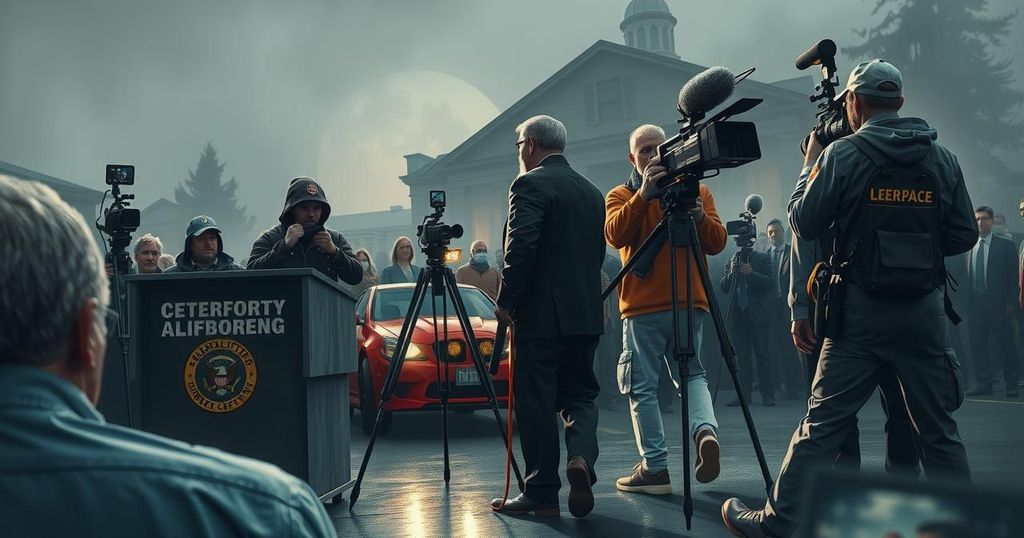America’s Political Climate Intensifies Amid Immigration Strife
America is increasingly fractious, with recent events in California highlighting the dire consequences of Trump’s immigration policies. A chaotic incident involving Senator Padilla raises questions about dissent and authority, while the administration’s unyielding stance on immigration stokes fears of an escalating crisis. Democratic leaders are finally stepping up, but the challenge remains to find unity and clarity amid a polarized atmosphere.
America appears to be teetering on the edge of chaos, particularly in California, where frustration and anger have boiled over. Fueled by President Donald Trump’s aggressive immigration policies, escalating political turmoil seems to be leading the nation to a darker chapter. A shocking incident in Los Angeles on Thursday—where Democratic Senator Alex Padilla was forcibly removed from a press event—highlights the alarming turn of events that residents are grappling with as summer heat intensifies political tempers.
Scenes from that day were nothing short of shocking. Senator Padilla found himself at the centre of controversy when he was handcuffed and manhandled by security at a news briefing led by Homeland Security Secretary Kristi Noem. This incident doesn’t just reflect isolated tensions; it encapsulates a national mood spiralling towards violent confrontation. With no signs of de-escalation, the situation in California may be worsening.
Trump’s administration, it seems, is hell-bent on doubling down. The President has signalled intentions to ramp up enforcement efforts, targeting not merely undocumented migrants, but also those who legally reside in the country on humanitarian grounds. Recently, half a million Venezuelans, Haitians, Cubans, and Nicaraguans were told they must return to their troubled homelands, defying all logic and compassion.
Meanwhile, demonstrations against the President are taking shape across the nation. Organisers are planning “No Kings” protests in various cities ahead of Trump’s planned military parade, which is supposed to mark his 79th birthday this weekend. The rhetoric surrounding the protests is becoming increasingly ominous; the President—a man who has previously referred to dissenters as “the enemy from within”—is pushing the military’s presence in civilian areas.
The atmosphere is charged, and Democrats are beginning to rally, having been struck into action by the political absurdities of the situation. Governor Gavin Newsom’s confrontation with Trump escalated tensions when the President ordered National Guard troops to Los Angeles in response to protests. The imagery of Padilla being subdued by government agents while merely attempting to ask a question has become a potent icon of the times.
Nonetheless, there’s an important caveat. Officials tend to operate on instinct when their security is perceived to be at risk—especially given the recent attempts on Trump’s life. Padilla contested the narrative, stating, “I was there peacefully… I was forced to the ground, and I was handcuffed. I was not arrested. I was not detained.” His comments add a new layer to a deeply contentious story.
Noem’s initial reaction hinted at concern about the fallout of the incident, which she explained stemmed from security protocols. However, she quickly shifted her tone during a Fox News appearance, increasing pressure on Padilla’s actions. The government’s narrative escalated alongside the GOP, with House Speaker Mike Johnson condemning Padilla’s behaviour as inappropriate.
The implications of how Padilla was treated as a sitting senator are profound, and they reveal stark overtones related to race and power dynamics in America. Attorney General Rob Bonta remarked on the unrealistic description of Padilla as a threat: “He is not an animal; he’s a US senator.” The confrontation in Los Angeles risks portraying the realities of immigration and dissent through the lens of fear and aggression, a far cry from democratic norms.
Democratic leaders quickly responded, with some viewing this incident as not just an affront but a demonstration of growing dictatorial tendencies. Hawaii Senator Brian Schatz highlighted that being forced out of a press briefing feels more like the actions of a dictatorship.
As debate swirls around Padilla’s treatment, the context demands attention. It portrays a critical moment in which the Democrats could emerge unified; however, they must also confront the underlying complexities of immigration policy that Trump has weaponised masterfully. The public is, no doubt, yearning for a strategy that settles the divide, yet their own coalition seems hampered by differing agendas.
While protests and vigorous pushback against Trump are undoubtedly on the rise, there’s a more substantial question at play: Does the American populace want an end to this spiral of conflict? Tensions are simmering, and the reality is that Trump’s polarising rhetoric feeds into an existing frustration. Many feel trapped between understanding opposition to the administration’s harsh immigrations laws and the desire for reinforcing national security.
With increased confrontations at every turn, the President seems to have the upper hand, methodically stoking resentment and division rather than fostering understanding. Ironically, his strategy counters the cohesion that previous leaders have sought during turbulent times.
In closing, the question persists—what path to actual resolution can emerge from this chaotic scenario? For all the condemnation of past administrations, Trump’s chosen course may potentially lead not just to the erosion of political norms, but the collapsing foundations of American democracy itself.
In sum, America faces a boiling point wherein deep political fractures are exacerbated by unchecked aggression from the Trump administration. The recent physical confrontation involving Senator Padilla exemplifies the risks of dissent in an increasingly autocratic and combative political climate. While Democrats can leverage this moment for resistance, crafting an effective immigration policy and restoring national harmony remain daunting tasks. Hence, as tensions rise, the pressing question is whether consensus amid chaos can be achieved before it’s too late.
Original Source: www.cnn.com
